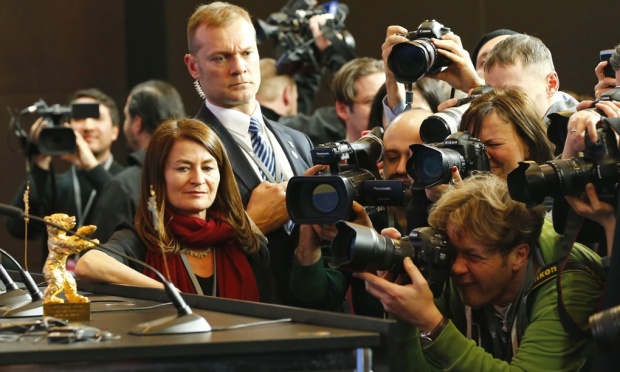JAFAR PANAHI GETS GOLDEN BEAR AT BERLINALE
The film world a political injustice loveth (but it also loveth good cinema). And in a perfect storm of urgent, inspired filmmaking and jurisdictional accuracy the Golden Bear, the top award at the Berlinale, went to Jafar Panahi for his film “Taxi,” a day after the FIPRESCI prize was given to him. Many of the other awards given out last night went to the underdogs, directors making cinema on a small but vital scale.
Panahi has been forbidden to work and travel abroad by Iran’s regime.
Since the filmmaker could not be here the award was received by his niece, Hana Saeidi, who plays in the film. “I can’t say anything. I’m too moved,” the little girl said, in tears, as she hoisted the trophy in the air under the glare of the photographers’ cameras.
“Instead of allowing himself to be crushed by anger and frustration, Jafar Panahi created a love letter to cinema,” said jury president Darren Aronofsky, further remarking that his film was “filled with the love he has for his art, his community, his country and his audience.”
The Golden Bear statuette, now a symbol for so much more than a legacy of vital cinema and eminent past awardees, was photographed alone after the ceremony, without its attendant filmmaker.
Acclaimed at the Berlinale, “Taxi” is a both a funny and striking take on Iranian society told through the wanderings of a cabbie through the streets of Tehran, with Panahi playing himself and driving the cab.
His passengers, a colorful cast of characters, say a lot about their country through their conversations as Panahi tries to capture the soul of what makes Iran Iran.
After “This Is Not a Film” and “Curtain” (“Pardeh”) this is the third feature film made by Panahi in defiance of the authorities’s ban imposed on him. He was arrested in 2010 while on pre-production for a film about the events surrounding the fraudulent re-election of Mahmoud Ahmadinejad in 2009.
Panahi was sentenced to six years in prison and got a twenty year-ban on making films or traveling. He got a precarious kind of freedom living under house arrest, then found his way out after this sanction was lifted. Other awardees last night included young and hungry filmmakers who earned some much-deserved accolades, this following the high-profile premiere of “50 shades of grey” earlier this week.
Shades of grey, shmades of grey. After stealing everyone’s thunder with its premiere “50 Shades of Grey” was thankfully swept aside by the benevolent Gods of Berlinale to make way for films that actually deserve attention.
Other awards included the Silver Bear for the Chilean director Pablo Larrain for “El Club,” a film that focuses on a group of Roman Catholic priests who have in various ways dishonored the Catholic church and have been relocated to a small seaside town. The jury said it expected the film would become a “classic of the history of cinema”.
In an unusual move, the Romanian and Polish directors Radu Jude and Malgorzata Szumowska were both given best director honors for their films “Aferim!” and “Body” by the Aronofsky-led jury. The Guatemalan film “Ixcanul Volcano” by director Jayro Bustamente, a film that describes how a poor Mayan teenager on a coffee plantation plots to leave for the United States with her boyfriend secured a Silver Bear “for a feature that opens new perspectives.”
news via inbox
Nulla turp dis cursus. Integer liberos euismod pretium faucibua


